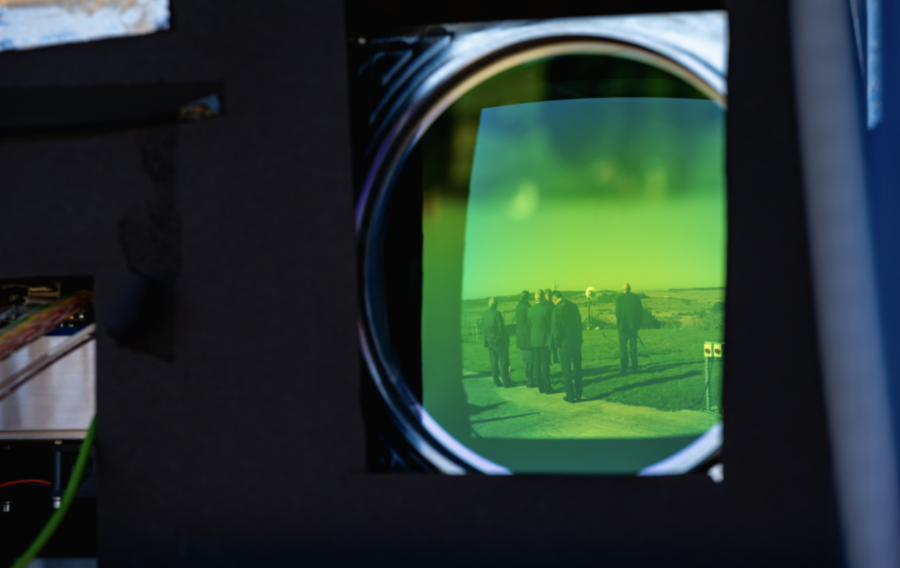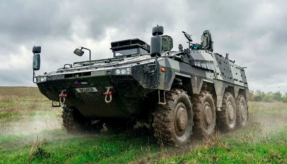
The MOD’s Defence Science and Technology Laboratory (Dstl) has hosted the UK’s first high-powered, long range laser directed energy weapon (LDEW) trial on its ranges at Porton Down.
The trials involve firing the UK DragonFire demonstrator at a number of targets over a number of ranges, demanding pinpoint accuracy from the beam director.
These tests improve the UK’s understanding of how high-energy lasers and their associated technologies can operate over distance and defeat representative targets.
The ability to deliver high levels of laser power with sufficient accuracy are two of the major areas that need to be demonstrated in order to provide confidence in the performance and viability of LDEW systems.
The programme has developed a UK sovereign ‘centre of excellence’ staffed with experts from multiple fields. Laser directed energy weapons have the potential to provide lower cost lethality, reduced logistical burden and increased effectiveness when compared to other weapon systems – the technology could have a huge effect on the future of defence operations.
The programme’s specialist industry partners are:
- MBDA, with overall responsibility for the system; MBDA have developed the advanced command and control (C2) and image processing capabilities
- Leonardo, who have developed the beam director which can track and point at targets with pin-point accuracy
- QinetiQ’s laser experts, who have built a phase-combined laser capable of generating in the order of 50kW of power, with the ability in the future to scale fire-power levels
Dstl’s Technical Partner, Ben Maddison said: “This trial is the culmination of design, development and demonstration activity over a number of years.
“DragonFire has already successfully demonstrated an ability to track targets with very high levels of precision and to maintain a laser beam on the selected aim-point.
“This trial has assessed the performance of the laser itself – the outcome shows that the UK has world-leading capability in the technologies associated with laser directed energy weapons (LDEW) systems.”
Chris Allam, UK Managing Director and Executive Group Director of Engineering at MBDA said: “These successful trials are the latest step in accelerating delivery of a UK sovereign laser directed energy weapon (LDEW) capability. MBDA, Leonardo, QinetiQ and Dstl all working together are putting the UK at the forefront of research and technology in laser domain.
“The results from these trials have verified analysis and given the team confidence that DragonFire will offer a near term and unique capability.”
The trial is the culmination of significant joint investment by the UK Ministry of Defence (MOD) and industry over a number of years totalling around £100 million.
Mark Hamilton, Managing Director Electronics UK, Leonardo said: “The DragonFire project draws on our decades of high energy laser and beam director heritage to put the UK at the very forward edge of what is possible in laser technology.
“The results of this live trial, which saw our beam director integrated into the DragonFire system, were impressive. We are looking forward to the next stages of the programme.”
QinetiQ Chief Executive, Steve Wadey, added: “We are delighted to have been involved in the trial, which has brought together the best of UK industry expertise in the complex weapons environment to work in close collaboration with Dstl.
“QinetiQ’s coherent beam-combining technology offers a laser system that can achieve an enhanced power density and increased engagement range, that is scalable for future uses. The trial has proven the performance of these laser technologies and their potential for adoption in sovereign defence capabilities.”
This technology could provide the basis for a number of future weapon systems. The DragonFire project is running in parallel and closely connected to other defence programmes including the Novel Weapons Programme.
Through the Defence and Security Accelerator (DASA), Dstl is currently seeking innovations to better understand the next steps necessary to develop and introduce the first generation of deployed directed energy weapons.
If you would like to join our community and read more articles like this then please click here.
Dstl Laser directed energy weapon LDEW Leonardo QinetiQ UK DRAGONFIRE







